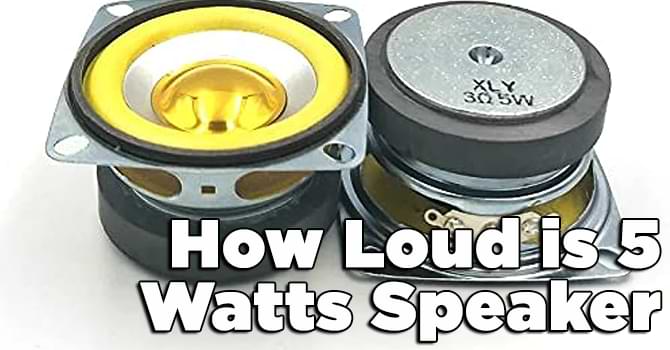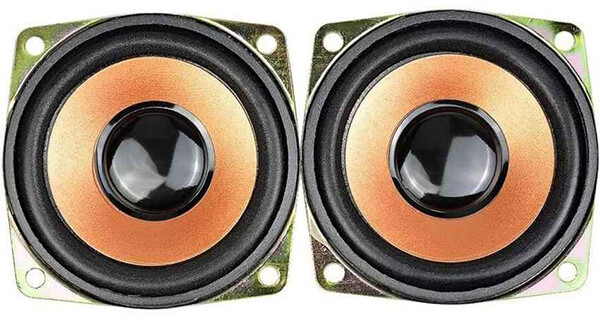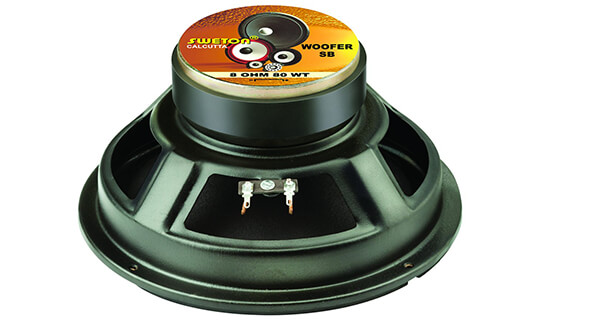How Loud is 5 Watts Speaker [Sound Quality]
The interplay between power and sound in the realm of audio technology is a captivating subject. Speakers, driven by wattage, have the ability to shape our auditory experiences. While a 5-watt speaker might seem unassuming in power, it possesses the capacity to offer a range of sound encounters.

By delving into the nuances of watts, decibels, and the distinct characteristics of these speakers, we can unravel the answer to a common query: How loud is a 5-watts speaker capable of being?
# Table of Contents =>
- 1 Understanding Watts: The Power Behind Sound –
- 2 Comparison Table:
- 3 The 10-Watt Speaker: A Gentle Introduction –
- 4 Stepping Up: The 20-Watt Speaker –
- 5 Entering the Midrange: The 80-Watt Speaker –
- 6 The Century Mark: The 100-Watt Speaker –
- 7 Unleashing Power: The 1000-Watt Speaker –
- 8 The Curious Case of the 5-Watt Speaker –
- 9 Are 5 Watt Speaker Good for Sound?
- 10 Situational Fit –
- 11 FAQs –
Understanding Watts: The Power Behind Sound –
Before diving into the specifics of different wattage speakers, it’s important to grasp the concept of watts itself. In the context of audio, a watt measures the electrical power being used by a device to generate sound.
It’s essentially the rate of energy transfer, indicating how much power a speaker can handle and how loudly it can produce sound. The relationship between wattage and loudness isn’t linear; every 10-dB increase requires roughly ten times the power.
Comparison Table:
| Features – | 5-Watt | 10-Watt | 20-Watt |
|---|---|---|---|
| Sound Output | Moderate volume, suitable for personal use and small spaces. | Slightly louder, good for small rooms or intimate gatherings. | Noticeably louder, suitable for small to medium-sized rooms. |
| Sound Quality | Decent sound quality at lower volumes. Might lack depth and bass. | Improved sound clarity, with slightly better bass response. | Crisper highs, better bass, and more pronounced audio details. |
| Portability | Highly portable, ideal for on-the-go use and outdoor activities. | Portable, convenient for moving between rooms or taking outdoors. | Portable, but slightly larger due to increased power components. |
| Energy Efficiency | Very energy-efficient, conserves battery life for extended use. | Energy-efficient, but may consume a bit more power than 5-watt speakers. | Consumes slightly more energy due to higher wattage components. |
| Suitable Uses | Personal listening, background music, and travel scenarios. | Personal listening, small gatherings, and indoor use. | Personal use, small parties, and enhancing audio for indoor spaces. |
| Room Coverage | Best for individual use or small spaces, might struggle in larger rooms. | Can cover small rooms effectively, might lack power for bigger areas. | Suitable for small to medium-sized rooms, offering more coverage. |
| Connectivity | Typically offers basic connectivity options like Bluetooth or aux-in. | Offers standard connectivity options, potential for more features. | Similar connectivity options, potential for advanced features. |
| Price Range | Generally more affordable due to lower wattage and features. | Slightly higher priced due to increased power and potential features. | Moderately priced, balancing performance and affordability. |
The 10-Watt Speaker: A Gentle Introduction –

A 10-watt speaker is often found in compact devices such as portable radios and small computer speakers. While these speakers might not provide room-filling sound, they are perfect for personal listening experiences.
A 10-watt speaker can produce around 85 to 90 decibels (dB) of sound, which is akin to the volume of normal conversation. They’re suitable for quiet environments or intimate gatherings where overpowering sound is unnecessary.
Stepping Up: The 20-Watt Speaker –

With double the wattage comes an increase in volume potential. Sound levels can reach 90 to 95 decibels with a 20-watt speaker. The sound output level is appropriate for small rooms and spaces. The volume is ideal for offices and rooms that require a higher volume. There is a slight increase in lows compared to their 10-watt counterparts on these speakers.
Entering the Midrange: The 80-Watt Speaker –

As we move up the power ladder, the 80-watt speaker emerges as a contender for enhancing audio experiences in medium-sized rooms. Capable of producing sound levels between 95 and 100 dB, these speakers are suitable for gatherings and parties. They can fill a room with sound without distortion, making them popular choices for home entertainment systems.
The Century Mark: The 100-Watt Speaker –

Hitting the 100-watt mark signifies a significant step towards higher volumes and greater sound clarity. A 100-watt speaker can generate sound levels ranging from 100 to 105 dB. These speakers are often used in home theaters or larger rooms, providing immersive audio experiences for movies and music. They deliver more pronounced bass and can capture intricate details of sound.
Unleashing Power: The 1000-Watt Speaker –

Entering the realm of powerhouse sound, the 1000-watt speaker is designed for venues and events that demand sheer audio dominance. With the ability to achieve sound levels beyond 110 dB, these speakers are capable of filling stadiums and concert halls. Paired with professional audio setups, they can deliver deep bass, crisp highs, and a breathtaking audio impact that resonates with the audience.
The Curious Case of the 5-Watt Speaker –
Now that we’ve explored various wattage levels, it’s time to circle back to the initial question: How loud is a 5-watts speaker? A 5-watt speaker generally produces around 80 to 85 dB of sound. While not extremely loud, it’s comparable to the volume of background music in a restaurant.
These speakers are commonly found in small portable devices, like pocket-sized Bluetooth speakers, providing convenience and portability while sacrificing some volume for their size.
Are 5 Watt Speaker Good for Sound?
The value of 5-watt speakers often raises questions due to their unique features. Exploring the advantages and limitations can help decide if these speakers suit your needs. This article evaluates the pros and cons of 5-watt speakers, illuminating their appropriateness for different situations.
Pros of 5-Watt Speakers –
Portability: Their small size makes 5-watt speakers highly portable, ideal for travel or outdoor use.
Energy Efficiency: With low power consumption, they preserve battery life for longer usage.
Personal Listening: These speakers are great for solo listening sessions, providing a background vibe for various activities.
Affordability: Budget-friendly pricing makes 5-watt speakers accessible for enhancing audio experiences.
Cons of 5-Watt Speakers –
Limited Sound: Their lower wattage results in modest sound output, struggling with larger spaces or noisy environments.
Bass and Depth: Due to size and wattage, these speakers might lack deep bass and intricate audio reproduction.
Unsuitable for Gatherings: They aren’t suitable for parties or bigger crowds due to inadequate volume.
Connectivity Limits: Connectivity options might be restricted compared to higher-end models.
Situational Fit –
5-watt speakers are ideal for portable use, personal listening, and conserving energy. They’re not suited for loud environments or those seeking powerful audio.
In the realm of audio, wattage is the driving force behind the loudness and overall quality of sound that speakers produce. From the modest 5-watt speaker to the thunderous 1000-watt powerhouse, each wattage level serves a specific purpose in various contexts. Whether 5-watt speakers are worth it depends on your requirements.
They excel in specific scenarios such as portability and personal listening, but might not deliver intense sound. Consider your needs and preferences to determine if 5-watt speakers align with your audio aspirations. Now you are understanding the “How Loud is 5 Watts Speaker”.
FAQs –
Q1: Is a 5-watt speaker suitable for outdoor use?
Answer: Yes, a 5-watt speaker is suitable for outdoor use, especially in quiet environments or personal outdoor activities. It offers portability and energy efficiency, making it a good choice for picnics, hiking, or relaxing outdoors.
Q2: What are the limitations of a 5-watt speaker?
Answer: The main limitations include lower sound output, limited bass, and potential difficulty in providing satisfactory volume for larger gatherings or louder environments.
Q3: Can a 5-watt speaker be used for parties?
Answer: A 5-watt speaker might not be the best choice for parties due to its relatively lower volume. It might get drowned out in noisy party environments. However, it can work for small gatherings.
Q4: Do 5-watt speakers have connectivity options?
Answer: Yes, many 5-watt speakers offer connectivity options like Bluetooth, aux-in, or USB. However, their connectivity features might be more limited compared to higher-wattage models.
Q5: How can I make the most of a 5-watt speaker’s performance?
Answer: To maximize a 5-watt speaker’s performance, use it in smaller, quieter spaces, and avoid pushing it to its volume limits. Additionally, consider placing the speaker on a solid surface to enhance its sound projection
Last Updated on September 14, 2023 by Perry Garner


